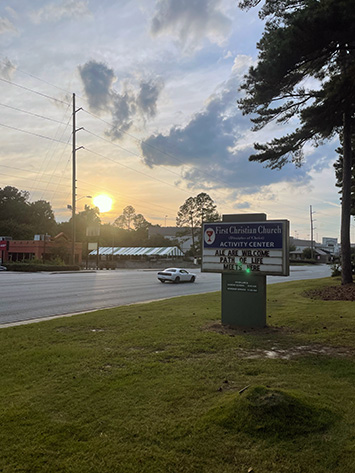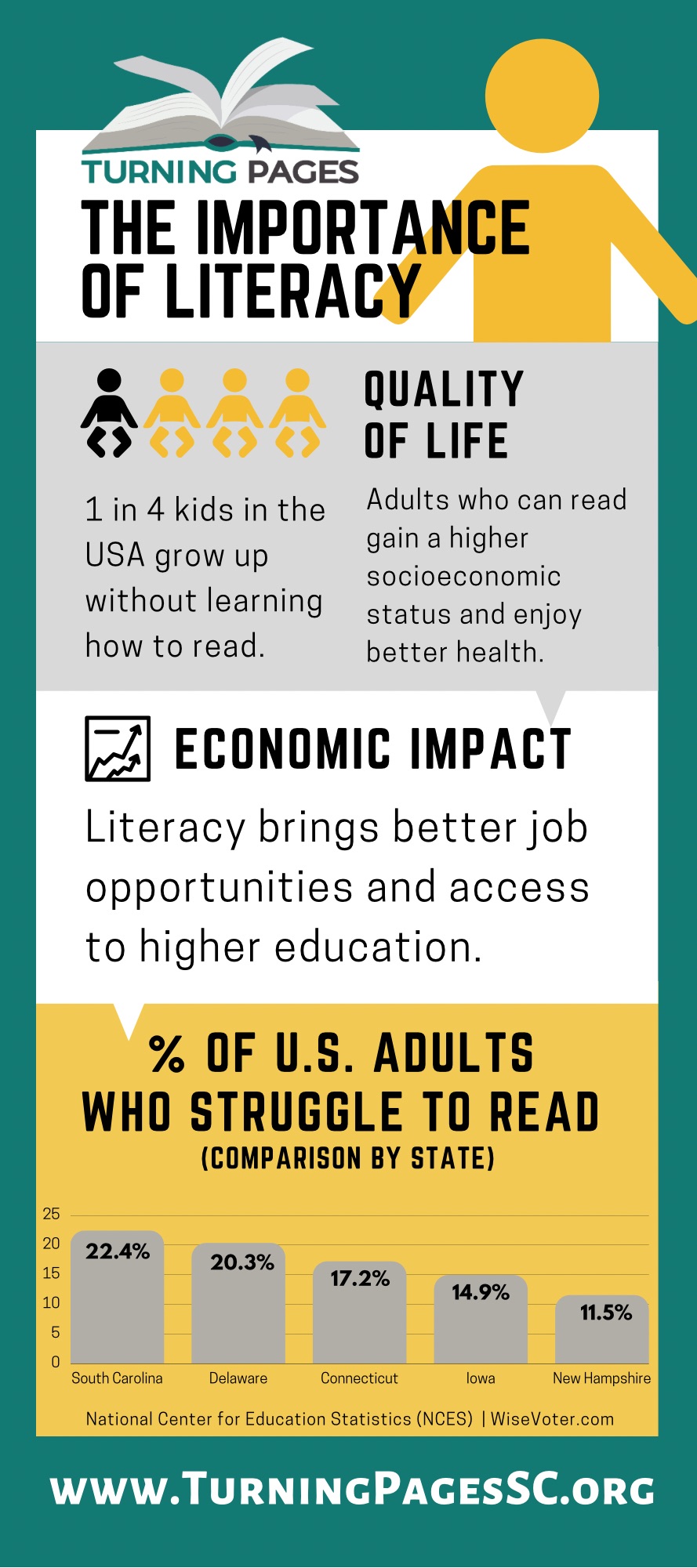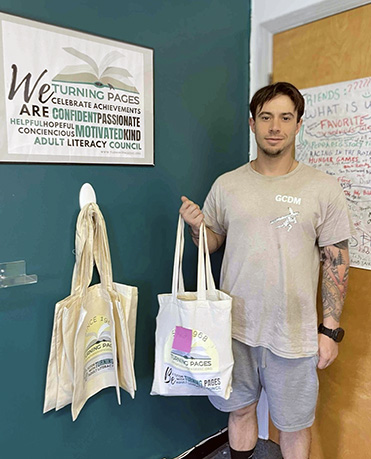Turning Pages SC combating adult illiteracy in the Midlands
Turning Pages SC combating adult illiteracy in the Midlands ... University of South Carolina


Turning Pages SC: Increasing Literacy Rates in South Carolina
One group of students in the Midlands can meet their reading tutors anywhere.
They can gather in a public park, public library, or even in churches.
But these students have no homework, exams, or even class. They are South Carolina adults who never received the opportunity to increase their reading level.
About 22.4% of South Carolinian adults struggle to read, according to the National Center for Education Statistics.
That means almost 800,000 adult South Carolinians can’t read at a fully functional level, said Lisa Cole, interim executive director of Turning Pages SC.
The Midlands literacy group is trying to change the narrative through different programs and curricula aimed at helping the troubled demographic.
Founded in 1968, Turning Pages is committed to increasing the statewide literacy rate through personalized, one-on-one tutoring free of charge in the Midlands area.
Two of the organization’s students recently finished Turning Pages’ “24 Hours to Success” program, where students over a six-month period pair with a volunteer tutor at a library to read one hour a week for 24 weeks.
“Our second reader who just finished our program started at a sixth-grade, second-month level but finished at a seventh-grade, eight-month level,” said Cole. “So she grew almost two years’ worth of skills in our program.”
The program is called “24 Hours to Success” based on research that it takes about 24 to 30 hours to move the needle on reading, Cole said.
Cole has worked to improve the influence of the organization, tripling the board size while attracting more than 75 new volunteers, according to the organization’s website.
“When they see that growth and they express more confidence about reading, that is what causes a true impact in Columbia,” Cole said.
The impact of Turning Pages has been noticed throughout the organization’s time in the Midlands, with more than 1,700 tutors trained and 6,000 learners taught, according to the organization’s website.
Turning Pages works because it has a flexible approach to learning that makes people feel comfortable, a volunteer tutor said.
“I want to work with Turning Pages because I feel this organization aligns with my core values,” said tutor Darlene Granite. “I know there isn’t a ‘one size fits all’ approach to teaching and I want to be in an environment where all students can feel safe and learn in the best way that suits them.”
“The more people we get literate, the better our state gets as a whole,” Cole said. “I would love to see us as a national model for a literacy council.”
The organization received a $1,000 donation from Columbia Sertoma Club earlier this September.
But said the organization can never become stagnant, said board member Austin Floyd.
“I would love to see statewide funding to Turning Pages so that we can continue to be effective on a larger scale,” Floyd said. “I hope that people refer to Turning Pages just like if you need some sporting goods, you know where to go.”
To learn more about Turning Pages or to become involved, go to turningpages.org for information about volunteering as a tutor as well as historical facts about the organization.

The board meets at First Christian Church, at 2062 N. Beltline Blvd., in Columbia.


Volunteer tutors use curriculum kits when meeting with learners.
SDGs, Targets, and Indicators
1. Which SDGs are addressed or connected to the issues highlighted in the article?
- SDG 4: Quality Education
- SDG 10: Reduced Inequalities
- SDG 17: Partnerships for the Goals
The article discusses the issue of low literacy rates among adults in South Carolina and the efforts of Turning Pages SC to address this issue through literacy programs and tutoring. This aligns with SDG 4, which aims to ensure inclusive and equitable quality education and promote lifelong learning opportunities for all. It also connects to SDG 10, as improving literacy rates can contribute to reducing inequalities by providing equal opportunities for individuals who have been left behind due to their low reading levels. Additionally, SDG 17 is relevant as Turning Pages SC collaborates with volunteers and organizations to achieve their goals.
2. What specific targets under those SDGs can be identified based on the article’s content?
- Target 4.6: By 2030, ensure that all youth and a substantial proportion of adults, both men and women, achieve literacy and numeracy.
- Target 10.2: By 2030, empower and promote the social, economic, and political inclusion of all, irrespective of age, sex, disability, race, ethnicity, origin, religion or economic or other status.
- Target 17.17: Encourage and promote effective public, public-private, and civil society partnerships, building on the experience and resourcing strategies of partnerships.
Based on the article’s content, the specific targets that can be identified are Target 4.6, which focuses on achieving literacy for adults, and Target 10.2, which aims to promote the inclusion of all individuals irrespective of their literacy levels. Additionally, Target 17.17 is relevant as Turning Pages SC collaborates with volunteers and organizations to achieve their goals.
3. Are there any indicators mentioned or implied in the article that can be used to measure progress towards the identified targets?
- Indicator: Percentage of South Carolinian adults who struggle to read.
- Indicator: Number of adult South Carolinians who can’t read at a fully functional level.
- Indicator: Number of tutors trained by Turning Pages SC.
- Indicator: Number of learners taught by Turning Pages SC.
The article mentions the percentage of South Carolinian adults who struggle to read, which can be used as an indicator to measure progress towards Target 4.6. The number of adult South Carolinians who can’t read at a fully functional level is also mentioned, which can serve as an indicator for the same target. Additionally, the number of tutors trained and learners taught by Turning Pages SC can be used as indicators to measure progress towards the organization’s efforts in achieving the targets.
4. Table: SDGs, Targets, and Indicators
| SDGs | Targets | Indicators |
|---|---|---|
| SDG 4: Quality Education | Target 4.6: By 2030, ensure that all youth and a substantial proportion of adults, both men and women, achieve literacy and numeracy. | – Percentage of South Carolinian adults who struggle to read. – Number of adult South Carolinians who can’t read at a fully functional level. – Number of tutors trained by Turning Pages SC. – Number of learners taught by Turning Pages SC. |
| SDG 10: Reduced Inequalities | Target 10.2: By 2030, empower and promote the social, economic, and political inclusion of all, irrespective of age, sex, disability, race, ethnicity, origin, religion or economic or other status. | – Number of adult South Carolinians empowered through improved literacy. – Increased social inclusion of individuals with improved literacy levels. |
| SDG 17: Partnerships for the Goals | Target 17.17: Encourage and promote effective public, public-private, and civil society partnerships, building on the experience and resourcing strategies of partnerships. | – Number of partnerships established by Turning Pages SC with volunteers and organizations. – Increased collaboration between Turning Pages SC and other stakeholders. |
Behold! This splendid article springs forth from the wellspring of knowledge, shaped by a wondrous proprietary AI technology that delved into a vast ocean of data, illuminating the path towards the Sustainable Development Goals. Remember that all rights are reserved by SDG Investors LLC, empowering us to champion progress together.
Source: carolinanewsandreporter.cic.sc.edu

Join us, as fellow seekers of change, on a transformative journey at https://sdgtalks.ai/welcome, where you can become a member and actively contribute to shaping a brighter future.







